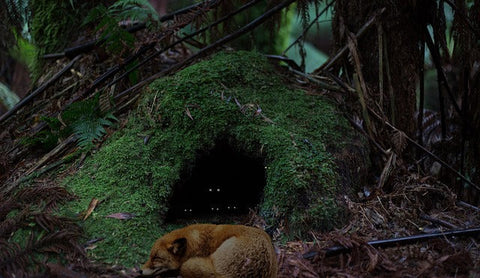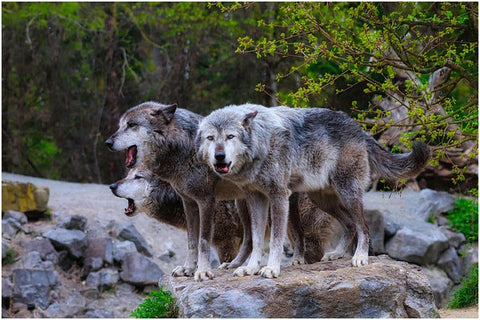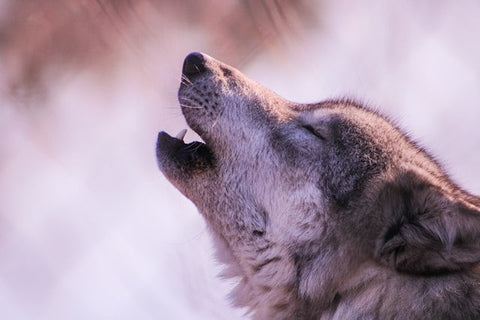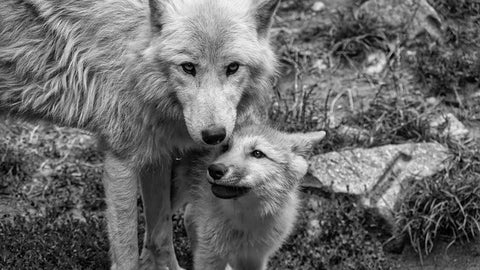
The Lone Wolf
of reading - words
The wolf is a wild animal, renowned for its strength, endurance, intelligence, and sense of freedom. It is believed to be a social animal that lives in packs; however, lone wolves, who live independently of their clan, are sometimes observed. In this article, we will discover the main reasons for this phenomenon.
The wolf in a pack
The wolf is a carnivorous animal of the canid family (Canidae). It lives in packs of around a dozen individuals and is subject to a strong social hierarchy.
At the top of the hierarchy is the Alpha couple , the leader couple who lead the herd. At the bottom is the Omega wolf, the scapegoat of the pack, who is responsible for absorbing tensions between its members, in order to maintain peace within the pack. The middle ranks include the Beta wolves, Gamma wolves and the wolf cubs.
This mammal is sociable by nature. Social animals instinctively know that a pack is more likely to survive than going it alone, especially in harsh climatic conditions. Packs rely on coordination among their members to implement effective hunting strategies, resulting in a substantial haul.

The strong unity of the pack has inspired many peoples, including Native Americans. Native Americans greatly revere this wild animal, for its powerful profile and also for the strong social bond that unites the members of its pack and transmits the values of:
- protection of the family against foreigners,
- territorial defense,
- hunting in groups to capture larger prey.
However, the wolf can become solitary for various reasons.
Why does the wolf become solitary?
There are several causes that explain the isolation of the wolf, which can be categorized as follows:
- By choice : A wolf may choose to voluntarily leave the pack after losing its female wolf. However, this phenomenon is rare among female wolves.
- By necessity : The pack may separate from an adult wolf that becomes less efficient in hunting, due to the exhaustion of its physical abilities. Or, this predator may decide to move away from the clan when food becomes insufficient for all individuals. Furthermore, a lost fight can also be a reason for this animal to make this decision to separate.

The omega wolf may be rejected by his pack members. Or, he may decide to leave the pack to become independent and break away from his subservience to his leaders (Alpha wolves) and sub-leaders (Beta wolves). Then, he may leave the pride with the goal of becoming the leader of another pack and becoming the dominant wolf leader.
- By evolution : wolf cubs grow over time and become stronger and more powerful wolves. Therefore, their food needs increase, which threatens the clan's food security. This is why some young wolves (6 to 24 months old) partially detach themselves from the herd, with the aim of exploring new areas rich in food. However, they remain in communication with their pack, notably through howling.
Some adolescent wolves choose to abandon their packs, in order to experience life outside their territories and build new clans and social hierarchies.
- By authority : The wolves of the pack reject the foreign wolf, who then finds herself lonely. Furthermore, in order to exclusively preserve the reproductive advantage, the alpha wolf becomes cruel to other females to intimidate them and prevent them from mating with her mate or even with another wolf.

When conflict erupts between females, the alpha female may lose the battle to a younger wolf with more robust physical abilities. Faced with this realization, the former alpha wolf cedes the leadership crown to the new one and leaves the pack, seeking a solitary companion with whom she can rebuild a family.
- For reproduction : the quest for love and a partner to mate and start a family, pushes the male to explore new territories and engage in cruel battles, in search of his future mate. As a result, two lone wolves may cross paths when they find a favorable climate: a large enough territory and abundant food sources.
👇 A young wolf finds the perfect trick to join a new pack 👇
🐺 Conclusion 🐺
The wolf is known for its qualities of strong intuition, prudence, vigilance, ferocity, determination, and robustness. Thanks to these traits, lone wolves successfully overcome the obstacles of living alone. Thanks to their fighting spirit, they can survive and protect themselves against many threats.
If this profile excites you and you're drawn to the majesty of this spirit animal, discover our collection of wolf figurines ! Don't miss the opportunity to benefit from them at an attractive price with free delivery.






